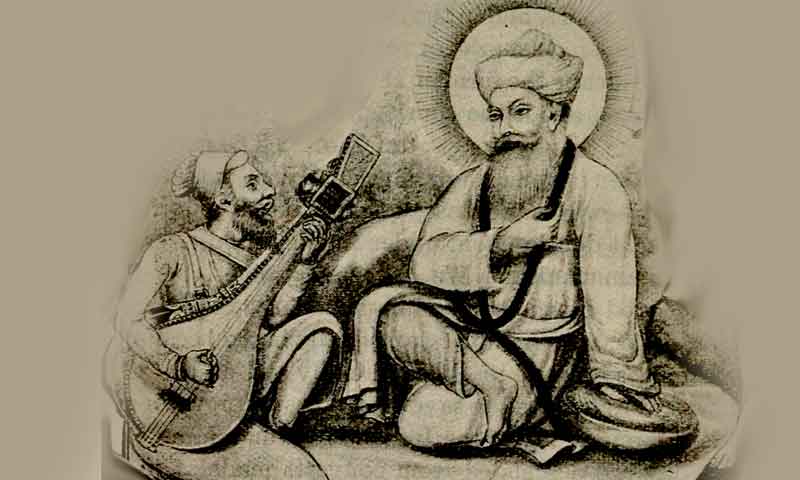
The Teachings of Guru Nanak

When I was there, Hari was not there. When Hari was there, I was not there. Nanak, Japji Sahib
The Mul mantra or the seed mantra with which the Adi Granth begins contains the essence of Nanak's teachings. It declares that God in one and His name is Truth. He is eternal and formless, who can be realized only through His grace. Nanak offers a simple yet direct solution to reach God and that path is through the heart of the seeker. His teaching is earthly and practical, which anyone test and find God within themselves. Through singing and praying one becomes immersed in the thought of Him and enters the state of Samadhi, or union with God. Thus, for Nanak prayer becomes the path when one is totally immersed in it. The following are a few important aspects of his teachings.
Ahimsa or non violence
Do not speak evil of any one. This is the ahimsa of thought. Do not speak harshly to any one. This is the ahimsa of speech. Do not impede any one's work. This is the ahimsa of action. Forgive him who speaks ill of you. Practice physical, mental and spiritual forbearance. Help those who are suffering even at the cost of your life.
Asceticism
Guru Nanak did not advocate ascetic life as a way to salvation. He himself led a normal life, amidst society, in touch with people of his time, though he was completely God centered and detached from the world and its ways. He preached that asceticism was not the way and the way to salvation was not incompatible with good life, laughing, eating, playing and dressing well.
Humility
Nanak was humility personified. He often described himself as servant of God or slave to God. He preached service to humanity as service to God and as the right means to cultivate humility. He never declared himself as a prophet or founder of any new religious faith, though he was no less greater than the prophets who were born before him on the Indian soil. He exhorted his followers to crush the crust of pride into true humility and sow the seeds of love so that it would grow unhindered.
Religious tolerance
In many ways the teachings of Nanak aim to create amity and understanding among various religious creeds of his time. We cannot say that it was a deliberate attempt on his part to try to integrate the traditions and beliefs of Islam with those of the native religions. His faith in the universal harmony of various religions was in total agreement with his inviolable faith in God as the supreme lord and the goal of all our endeavors. He declared, "For me there no Hindu and no Muslim. With all I am at peace. The God residing in us renders us incapable of hate and prejudice."
God, soul and man
God is the supreme creator and commander, the one god, the eternal, all pervading, divine light. His form is beauty, his form is love, his form is justice, his form is bliss, eternal and immortal. All the virtues exist in Him. Man contains with in himself a tiny fragment of Him. As a fragment dwells in a flower, or an image in a mirror so does the soul resides in the human body. Man is truly a reflection of the glory of God, a true micro specimen of the infinitesimal Universal Soul. "Such is the divine play of God that He has reflected the whole cosmos in the human body."
The importance of surrender
According to Nanak, God is attained neither by a thousand thoughts nor by meditation nor by silence nor by wealth nor by any other means, except by surrendering to his will and becoming immersed in his name. You attain him when you abide by His will and make it your own
The five stages of spiritual progress
Guru Nanak explained the five stages of a man's spiritual progress which are enumerated below:
1. Dharam Khand: The first stage consists of performance of ones duty sincerely.
2. Gian Khand: The first stage leads to the second where a devotee gains a true awareness of the greatness of God, His true attributes.
3. Saram Khand: In this phase the devotee attains purity of mind and understanding.
4. Karam Khand: In the fourth phase, the devotee gains the fruits of his good actions. He acquires divine grace and true spiritual power.
5. Such Khand: through the grace of God now the devotee enters the realm of God, which is beyond all human activity and the ordinary reality.
Suggestions for Further Reading
- Basic concepts of Sikhism
- Guru Nanak Dev
- The teachings of Guru Nanak
- The Ten Gurus of Sikhism
- Best Websites On Sikhism
- Best Websites On Sikhism, Part 2
- Sikhism - Websites and General Resources
- Websites About Sikh Organizations and Guru Dwaras
- The Guru Granth Sahib - The Holy Book Of The Sikhs
- The Sikh Religion Its Gurus - Life Of Guru Nanak - Asa Ki War
- Divine Services By Guru Nanak And Other Gurus - Japji
- Rahiras
- Additional Slokas
- The Sohila
- Hymns Of Guru Nanak, Sri Rag
- Thus Sayeth Gurbani- a Book Review With Quotations
- God in the Gurbani
- A Book Review Three Phases of Struggle
- Books On Sikhism And Sikh Faith
- Essays On Dharma
- Esoteric Mystic Hinduism
- Introduction to Hinduism
- Hindu Way of Life
- Essays On Karma
- Hindu Rites and Rituals
- The Origin of The Sanskrit Language
- Symbolism in Hinduism
- Essays on The Upanishads
- Concepts of Hinduism
- Essays on Atman
- Hindu Festivals
- Spiritual Practice
- Right Living
- Yoga of Sorrow
- Happiness
- Mental Health
- Concepts of Buddhism
- General Essays